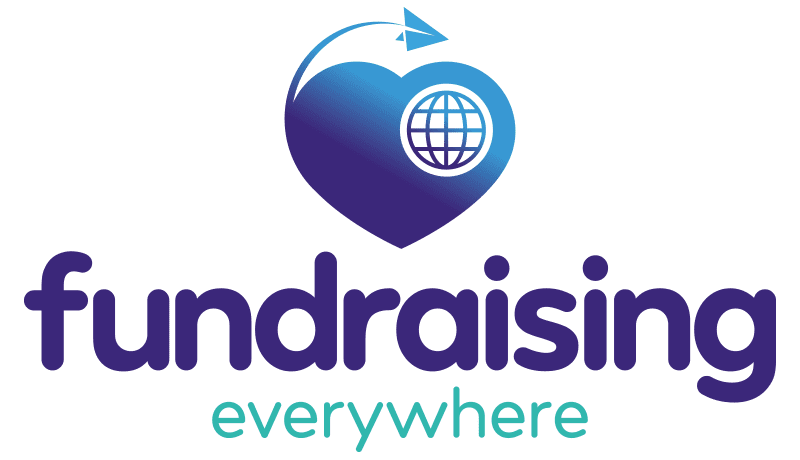
Guest blog post by David Page
David is a Director of Triceratops Training who offer affirming, accessible and affordable support for small charitable organisations. He has been around small charities his whole life as a service user, volunteer, staff member, leader and now as a consultant and trainer. He too struggles to juggle.
It is hard, isn’t it? So many balls in the air, and while it is definitely is a skill we need to master, it is not in the way we imagined as children.
As fundraisers we need to juggle, juggle so many relationships and responsibilities in copious contexts – feeling like we are being judged in all of them.
Consider too those working in smaller organisations, those who in addition to juggling the responsibilities of solo-fundraising, also have the liabilities of service delivery, leadership, communications, volunteer management and more tossed into the mix.
However, let’s not compare the struggles of others to our own, it is hard for all of us, isn’t it? No wonder burnout too often rears its head and the balls fall to the floor, cascading our issues to those who have to pick them up.
Right, that is enough bad news.
We are a people of action and not ones for wallowing in the mire.
I have the joy of connecting with, and hopefully helping, a plethora of diverse charities who appreciate a friendly hand to help guide them.
Recently a charity has approached me with succession planning on their mind. Why? Because the CEO knows that they are teetering under the pressure, and two huge unavoidable events are on the horizon. The Chair of the Board’s term is coming to an end, always a pressured time for leadership, but even greater is the fact that a close family member has been given a terminal diagnosis, and it is recognised that they, the CEO, will need to take extended leave to process the unavoidable grief.
This is astounding leadership, in having the foresight, self-awareness and humility in saying ‘we need help’, as they juggle all the relentless work responsibilities, but also navigate the deep reality of a personal life too.
And asking for that help proactively, before it is too late, it hugely admirable.
Help comes in a formal way, through professional external support as I offer, and through the upskilling staff and volunteers to share the load. But importantly, it also comes with peer support, finding those near you who are in similar situations.
Formal and informal, these avenues all offer wonderful wins, which is why our sessions at Triceratops Training try to cover both professional and peer bases with an affirming and understanding tone, one which I think we all need when we are facing up to huge, relentless challenges.
A burden shared is a burden halved – or so we are told.
So, my advice is to reach out, connect, extend your supportive network – it is what we all need if we are to thrive, no matter how we are wired.
You see, there are over 160,000 active charities around the UK with an income of under £1m. These charities are packed with people juggling just like you, people struggling just like you, people winning just like you, even if at times it does not feel that way.
So what are the next steps?
I am working on a couple of new communities especially for smaller organisations, neither of which are ready to be public yet, but both of which aim to make it easier for you to get the peer and professional support you need. Visit Triceratopstraining.co.uk, give us your email address and we will keep you updated.
In the meantime, communities already exist for you to tap into. Fundraising Everywhere is fantastic, and your local CVS or VSO are where I would start for that local connection (and maybe coffee and cake too).
It may also help to remember this from the irresistibly quotable author L.R.Knost “Taking care of yourself does not mean me first, it means me too”. So, take care of yourself by finding others who can, as you help take care of others.
Voice Your Thoughts 🗣️
Our platform is open to anyone and everyone in the sector that has an opinion, idea, or resource they would like to share to help make our sector better. If you would like write and share something, pop an email over to hello@fundraisingeverywhere.com and we will support you every step of the way to share your voice.

Claire is a digital mobiliser, fundraiser, and campaigner. Having worked in engagement and mobilisation teams at Greenpeace, ActionAid, Cancer Research UK and Amnesty International, she joined More Onion over eight years ago.
Since then she has delivered dozens of engagement and supporter journeys projects with organisations of all sizes and has trained hundreds of charity professionals in the same. She is now a Mobilisation Expert and Director at MoreOnion
It’s easy to get caught up in our organisation’s needs when talking to supporters. Please give us money, please support our campaign. But to develop a strong, deep and long lasting relationship, we need to consider supporters’ needs too.
Yes, that absolutely means you should be sending loyalty emails to show how their support is making a difference. For example, how you spent their money or how they contributed to a campaign win. But you shouldn’t stop there. So what’s one simple, yet really effective, thing that could take your supporter experiences and relationships to the next level? Engagement actions.
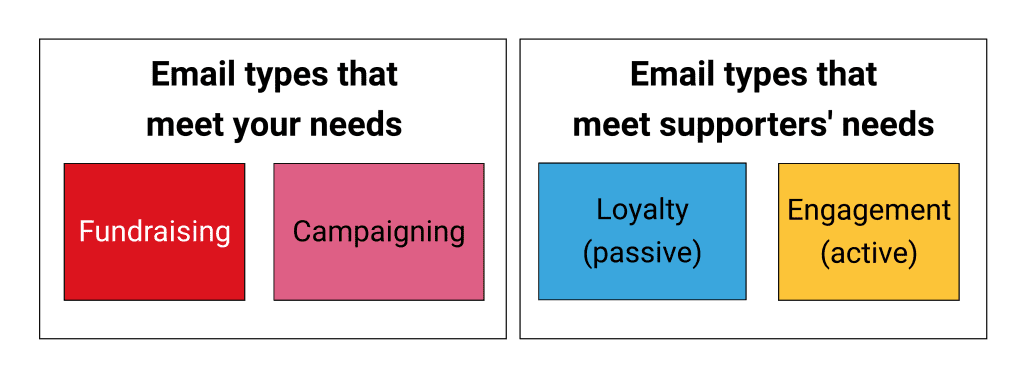
What is an engagement action?
An engagement action is a piece of content that invites your supporters to actively engage with you, and is primarily about one of their needs, not yours.
The ‘active’ bit here is really important. A quick way to assess whether your communication is active is to ask ‘can the supporter experience this fully with their hands in their lap (and without assistive technology like voice dictation)?’ If they can – it’s passive and therefore a loyalty communication, not an engagement action. It’s a fine line and one that’s often pretty easy to get over with a little creative thinking, but by using ‘active’ as the goal you can take something quite simple and create a much richer supporter experience.
For example, can someone watch a video with their hands in their lap? Yes, so it’s loyalty. But what if you made the video slightly interactive, asking the user to make decisions at the end of each section to guide their storytelling? Now, it’s engagement. It’s a fine line that makes a big difference. Now instead of talking at your supporters, you’re engaging with them.
Why bother with them?
At this point you might be thinking – I’m already so busy! Why should I make time for engagement actions?
The incredible thing about engagement actions is that they don’t need to take a huge amount of time or budget to create, but they can uplift the performance of all of your other work. And what’s more, you’ll be surprised at how much fun you have creating them!
Engagement actions can contribute to a large range of supporter objectives, including:
- Educate supporters about a topic
- Build supporter passion and/or empathy
- Help you to learn more about supporters (so you can enrich their experience)
- Help supporters to learn more about you
- Foster a sense of community
- Plus many more…
The right engagement action for the right audience can make people more likely to give and to remain donors for longer. One project in which we created a welcome email journey found that people who took a campaigning and/or engagement action were 4-5 x more likely to make a donation than those who didn’t.
Here’s some examples to get you started
1. A message exchange action to build empathy and connection
An engagement action can help you to connect your supporters to other key groups of people, like your charity’s clients or campaigners.
At Christmas, homelessness charity St Mungo’s invited supporters to write a Christmas message of hope to someone experiencing homelessness. These messages were printed and displayed on Christmas trees in St Mungo’s shelters across the country.

2. Gather expertise and build your community
Charity supporters have a wealth of knowledge and experience that could strengthen their work. So ask them for their input!
Environmental organisation Friends of the Earth Scotland asked their supporters to share their tips for reducing plastic usage and then shared those tips back with the community. This helped encourage supporters to think about the topic in their day to day lives, to produce a valuable resource, and help people feel connected to a broader community of like-minded people.
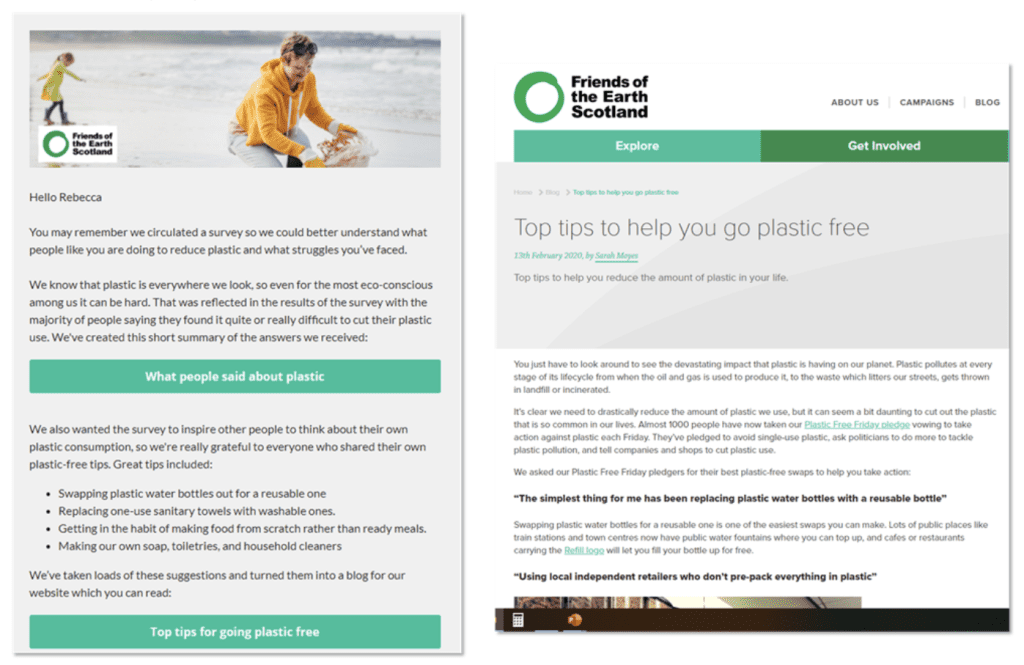
3. A resource finding tool
Help demonstrate your value by connecting people with useful resources.
Sustainable transport organisation Sustrans have a wealth of free resources on their website, but these could be hard to find if you don’t know what you’re looking for.
In this simple form they gathered key information on the supporter’s location and specific needs. At the end of the short form they were presented with a personalised range of resources relevant to their answers including local maps, cycle safety guides for children, and much more.
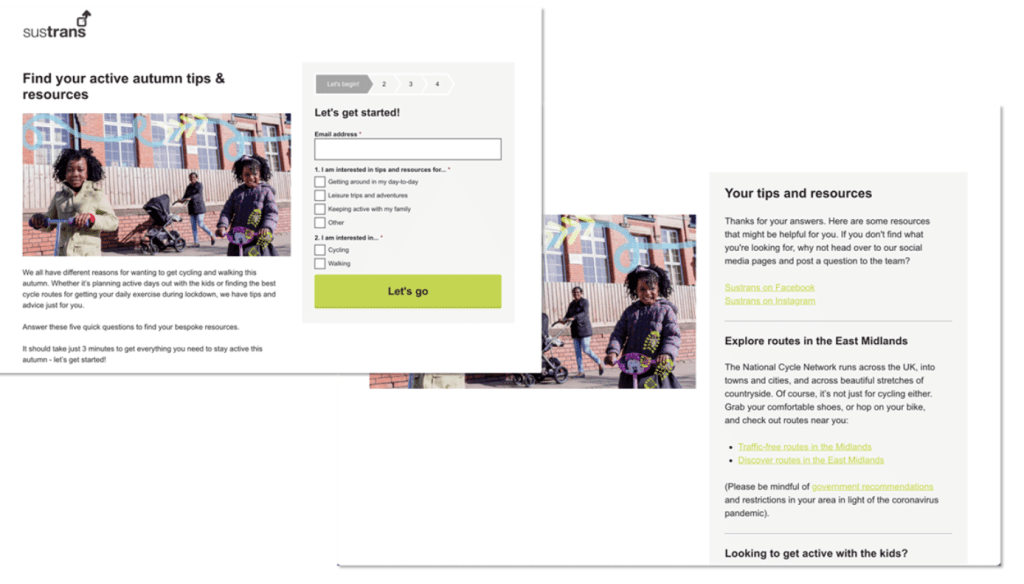
4. Make learning appealing
Do you work on a complex or difficult topic? Engagement actions can help make challenging subject matter appealing and accessible.
Freedom from Torture provide support to survivors of torture as they rebuild their lives in the UK. They wanted to build the knowledge of their newer supporters of the problem of torture and the stories behind it. They made this appealing by using the recipes that they had collected during their cooking classes – one of the many types of therapy that Freeedom from Torture provide. Supporters were asked to guess which country each dish was from and were then told the story of the survivor who cooked it. On the final step they were offered all of the recipes to download and try at home.
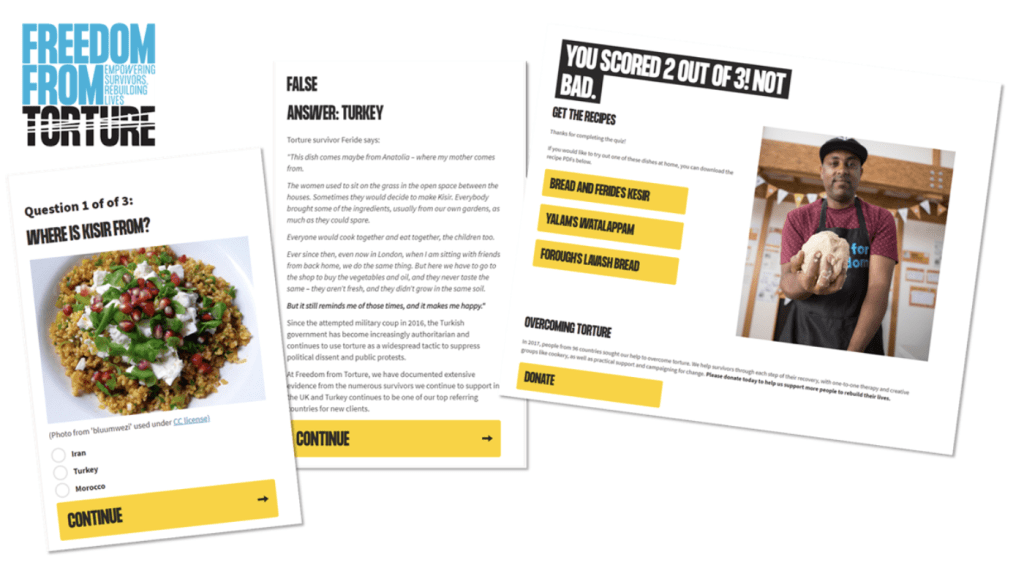
Engagement actions not only enrich supporter experience but they also enhance the overall impact of your work, proving that a small investment in creativity can yield substantial returns for supporter donations and lifetime value.
If you’d like to read more about engagement actions, you can download a free report at: https://act.more-onion.com/engagement_actions
If you want to hear more from MoreOnion, Claire will be speaking at Individual Giving Conference 2024 on Enhancing Donor Relationships through Strategic Engagement
Want to see more content like this? Sign up to our mailing list
Voice Your Thoughts 🗣️
Our platform is open to anyone and everyone in the sector that has an opinion, idea, or resource they would like to share to help make our sector better. If you would like write and share something, pop an email over to hello@fundraisingeverywhere.com and we will support you every step of the way to share your voice.

We wanted to take a minute to say, fundraising leaders, we see you.
In the ever-changing landscape of charity work and fundraising, you know better than most that leadership isn’t just about steering the ship; it’s about guiding the crew through storms with courage and compassion.
It’s not about having all the answers, but fostering collaboration, empowering others, and harnessing the unique strengths of everyone.
Leadership comes from all levels. Whether you’re a seasoned CEO or a frontline fundraiser, your voice and actions matter more than you realise. Each of us has a role to play, no matter our position or title.
Times may be tough, but tough times call for resilient leaders, like you. Your ability to inspire, motivate, and support those around you is the key.
In times like these, it’s easy to lose sight of the impact you’re making.
But trust us, your work matters more than you know. Your dedication, passion, and sheer determination to make a difference are what inspires us all here at Fundraising Everywhere every day.
So, as we navigate these uncertain waters, continue to lean on each other for support, share insights, and champion one another’s efforts. Together, we can face any challenge head-on and emerge stronger on the other side.
But while you’re busy steering the ship, don’t forget to take care of yourself. You can’t pour from an empty cup, right? Remember to carve out time for self-care, lean on your support network, and celebrate the wins, no matter how small.
And whenever you need us, we’re here. 💙
Want to see more feel-good content like this? Sign up to our mailing list
Voice Your Thoughts 🗣️
Our platform is open to anyone and everyone in the sector that has an opinion, idea, or resource they would like to share to help make our sector better. If you would like write and share something, pop an email over to hello@fundraisingeverywhere.com and we will support you every step of the way to share your voice.

Guest blog post by Sarah Tite
As a One of Many™ certified leadership coach and trainer, Sarah Tite brings together many years of leadership experience with tools and techniques that help people face challenges with confidence. She is Director of Sarah Tite Coaching Ltd.
I don’t have anything to say!
Funny way to start a blog you might think. But maybe not if this is why you haven’t yet taken up the opportunity to try out coaching with the funded session that comes as part of your membership with Fundraising Everywhere.
You may also be telling yourself that…
⏰ I don’t have time.
🎯 I have no big challenge to bring to my session.
😞 I am worried I might get upset.
❓ I don’t know what to expect.
💸 I am going to save my session for something important!
However, they say prevention is better than cure, in fact it is a fundamental principle of modern health care. It’s better to stop something before it happens, instead of having to deal with its consequences after the problem has already happened or the damage already done. And by the way your coach will share with you information about what to expect, and answer any questions you may have.
So, are you ready to talk. Ready to plan for the unexpected?
Not quite yet.
Ok.
Maybe I have made you a little curious about coaching, and how it may be of benefit to you.
Julie, Head of Fundraising was curious and so she booked her funded coaching session with me recently and this is what she said:
“I have always been interested in exploring the benefits of coaching, but I wasn’t quite sure what it would entail. The initial session was the perfect introduction to understanding coaching and gave me a full insight into how it could work for me. I would highly recommend!”
Highly recommended, praise indeed.
What could you expect from your coaching session?
- Different experiences and perspectives to a challenge, problem, or idea.
- Space to pause, to talk, think and explore with someone not involved day to day.
- You may get some new insights and ideas because all the coaching team having worked in the charity sector.
- Maybe now you come to think of it you do have something to say, a challenge to consider and unpick – we are ready to hold a space just for you – what are you waiting for?
When we feel more confident in ourselves, we are better able to deal with conflict, to communicate clearly, take feedback as learning rather than evidence of failure and help create happier workplaces where people can thrive not just survive.
Can I just check that you are not thinking this offer is only for leaders because it says so in the title!
Let me reassure you that leadership is not just a job title, it’s a mind-set too. It’s a way of thinking, behaving, and acting, so in reality you don’t always need a team or a project to lead, you can lead with your ideas, insights, and inspiration to create change and open minds to new ways of thinking.
What we need are people who think, or lead in new ways, with new ways of looking at things to create the change we want to see in this world. I am inviting you to consider that ‘leadership programmes’ like this one: https://www.fundraisingeverywhere.com/confident-charity-leaders/ are not just for those who have leader in their job title!
Are you ready to step into your healthy, happy and harmonious leadership, to focus on what you need to thrive at work, home and beyond then don’t wait until you know what to say because you can be sure that each of the coaching team will help you find your voice!
Let the last word be from a Fundraising Everywhere Member, Hannah who was coached by Judith:
“Judith embodies a transformative force. I’m immensely grateful for the opportunity to participate in coaching. Thanks to Judith’s guidance and expertise, I was able to pause and gain a broader understanding of my goals. Her motivation and encouragement have truly been invaluable on my journey towards achieving my personal and professional goals.”
Voice Your Thoughts 🗣️
Our platform is open to anyone and everyone in the sector that has an opinion, idea, or resource they would like to share. If you would like write and share something, email hello@fundraisingeverywhere.com and we will support you every step of the way to share your voice.

Guest blog post by Chris O’Sullivan
Stress Awareness Day falls this week, and we will likely see content about stress, and coping strategies.
Most of us are all too aware of stress, which the HSE defines as ‘the adverse reaction people have to excessive pressures or other types of demand placed on them’.
Fundraisers are part of a charity ecosystem that has never had a greater need to innovate, adapt, and deliver. We need to ‘do more, with less’. We need to be ‘resilient’. Many fundraisers need to be and do that with little support and development, within existing, or dwindling resources, whilst facing structural discrimination, inequality, or harassment, and in the context of difficult workplace relationships.
To solve the challenges that we face, we want to be at our best.
We should be able to look up and out with confidence to see opportunities on the horizon, and able to support those we lead with directness and empathy.
Awareness days and ‘moments’ can be helpful in drawing attention to a topic, but when it comes to promoting good mental health and preventing psychological injury at work, there needs to be sustainable action year-round.
This is a different blog to many you might read.
Yes, there are some tips for things you might do to build your resilience where you can, but it’s more about what organisations can and should be doing to change the nature of work to make our profession sustainable and successful.
The things we can do ourselves.
Social feeds always seem to be full of things we can do to change our world or live our best life. If we are powerless to change our circumstances, it can seem like this kind of content mocks our challenges or leans into a privilege we don’t have.
That said, most of us can find small steps to take, both as acts of self-care in challenging times and as part of more sustainable habits to bring to our work and lives.
Getting the basics in place can make a big difference especially when things are hard. Could your sleep be better? How’s your diet? Are you drinking enough water? What about getting outside in the light, or getting some exercise?
Recently the Mental Health Foundation published a new set of evidence-based tips for looking after your mental health and whilst some may seem obvious, it’s amazing how often we forget them.
It can be hard to find time, or money to do the things we’d like, so where employers can support and incentivise these activities with employee benefits, it can be a big help. We also need to understand that not everybody can adopt these strategies without help and support.
Of course, when we are in it, and up against it, stress, burnout and overwhelm are awful things to experience and it can be hard to imagine how we can change things for ourselves. When our mental health is challenged our minds often take us away from things that might help but seem counter intuitive – like exercise. We can also judge ourselves very harshly, so working on self-compassion skills in better times can really help. The Overwhelm First Aid Kit is a good resource to have on hand if you often find that you don’t know what the next step could be.
You may find that your employer offers an employee assistance programme which can be helpful in accessing counselling, or that you have access to benefits like this through a spouse’s employer, insurance or health plan. Samaritans is open 24/7, every day of the year, and you can call for free on 116 123.
What do leaders and organisations need to consider?
Managers, leaders, and boards need to be aware of their duties under the law, and the wider implications for performance, staff engagement, recruitment, and retention of talent in not acting.
As a sector, we often build out around the mission without the policies, systems and structures that enable organisations to function effectively when they grow. Passion and commitment often drive us forward and can help us cope with challenges – but dedication can also lead to our people going beyond or being pushed beyond their boundaries and into stress or burnout.
Burnout itself is often seen as a personal issue, but it has been categorised by the World Health Organisation as a “syndrome conceptualised as resulting from chronic workplace stress that has not been successfully managed.” Because so many of the factors that lead to workplace stress can’t be changed by individuals alone, or mitigated by simple solutions, burnout is very definitely an organisational challenge requiring organisational efforts to prevent.
So where to start?
All strategy starts with a clear definition of where you want to get to – which for most charities will be sustainable delivery of the charitable objects and mission.
Sustainability has often been about funding, and more recently also about environmental impact – but sustainability also includes supporting the major asset of most charities – the people who deliver the work.
Psychological safety is a term coined by Professor Amy Edmondson from Harvard Business School and it is key for fundraisers to succeed. Psychologically safe cultures create a space where people feel safe to speak up, take risks and learn from mistakes.
If you think about it, that’s where the gold lies in terms of high performance – Edmondson calls this the learning zone – where we are pushed by high standards and accountability but balanced by the safety and security to speak up, be heard, and grow.
Getting there is far from simple, but the reward can be huge.
A good place to start is with the fundamentals of good management. Line management relationships are crucial to workplace wellbeing, and it is crucial that people managers have the training and support they need to do that alongside the ‘delivery’ components that are asked of them.
As a supervisor, managing for good mental health might include ensuring that your team know what is expected of them, can see their efforts paying off, and sees you consistently applying the policies and processes in your organisation. It means receiving and acting on concerns and having difficult conversations directly but with kindness. It means building your self-awareness, setting boundaries, and committing to people management as a privilege and not a chore.
As a senior manager, it could mean committing to assess and manage stress risk by using the HSE stress risk assessment framework, putting a wellbeing metric on your board dashboard, or ensuring that your policies and procedures are inclusive, applied, and create minimal drag or dependencies. It could mean introducing a coaching programme, or employee benefits.
Leadership is more about values – showing integrity, and inspiring trust. Leadership isn’t always about job titles that loads of amazing movements for change and improved wellbeing – like #showthesalary, #charitysowhite and #charitysostraight have come out of collaborations at all levels.
As leaders, we need to understand our values, and how they blend with those of the organisation. If we commit to leading by example asking people to push themselves to new heights, then we must be prepared to grow and change and we must deliver what we say we will. We must also model the behaviour we want to see. We may even need to reimagine the way charities operate to truly meet the challenges people face – and therefore deliver sustainable impact to beneficiaries.
Wherever we are personally or organisationally, there’s a lot of good information, and good work happening in this field, and there are huge opportunities for peer networks and sharing of ideas.
Fundraising Everywhere also has an amazing new leadership programme for existing and aspiring leaders, which includes access to great content and free coaching taster sessions. Check it out.
Chris O’Sullivan is an experienced manager, fundraiser and leader with an interest in mental health and wellbeing in leadership. He previously led workplace mental health programmes for the Mental Health Foundation, developing and delivering evidence-based workplace mental health training and content across the UK.
Voice Your Thoughts 🗣️
Our platform is open to anyone and everyone in the sector that has an opinion, idea, or resource they would like to share. If you would like write and share something, email hello@fundraisingeverywhere.com and we will support you every step of the way to share your voice.

Written by Leesa Harwood, owner of By The Waves Charity Consulting and charity adviser, leadership coach and mentor.
Back in January, I wrote an article about my experience of burnout and how I could see the same signs in those around me.
The energy spike that usually accompanies the beginning of a new year failed to materialise amongst many of my third sector colleagues and I worried about their wellbeing. There was a huge reaction to the article leading to an online session to share experiences and advice.
Since I wrote my article in January, I continue to see symptoms of burnout and stress amongst sector leaders and their teams.
The more insecure we feel, the more we feed the other symptoms of stress, getting caught in a downward spiral
Five Signs of Stress
1. Loss of perspective
The small things get bigger as you lose the ability to step back and put problems into perspective. Soon, your head is filled with small but noisy problems punching above their weight.
2. Irritability
You find yourself snapping at those around you. A short temper and sharp tongue mean that friends, family and colleagues feel the impact of your lack of patience, perspective and rising stress levels.
3. Control
The more out of control you feel, the more controlling you become. As a leader you begin to interfere and disempower those around you, picking at the detail and wrenching projects away from others in a desperate attempt to regain control.
4. Ill health
Physical and mental health diminishes under acute stress. You don’t sleep, and feel tired all the time. You suffer from anxiety and depression. But as a leader you have been taught that resilience is non-negotiable. So, you keep going, deny your vulnerability and wait until you break before you finally stop.
5. Insecurity
As your performance as a leader starts to suffer, so does your confidence. This inevitably leads to self-doubt, a lack of confidence and an overwhelming sense of insecurity. The more insecure we feel, the more we feed the other symptoms of stress, getting caught in a downward spiral.
Leadership burnout is not inevitable. There are things we can all do to protect ourselves and each other from stress.
Beat burnout
At Fundraising Everywhere's Leadership Festival 2022 in the Culture Tent, Madison Gonzales (CEO of Morning Light Inc) brought burnout back into the spotlight. I for one am very grateful.
Leadership burnout is not inevitable. There are things we can all do to protect ourselves and each other from stress. If you or someone you know is experiencing from one or more of these signs of stress, catch up on Madison Gonzales' session as she guides us through ways to prevent burnout.
Madison shares how to make our workplaces happy and healthy places to be, with practical tips and reminders we can all take back into our work environments so we can foster a positive environment for all.
Building a culture where leaders and their teams feel confident, healthy and supported has never been more important. Catch up on Madison's and the other great Leadership Festival sessions On Demand.
A huge thanks to Leesa Harwood, who was Growth Tent Partner at the Charity Leadership Festival 2022. We collaborate with people who care about the future of our sector on our events. Each Tent Partner brings their insights and audience, meaning we can empower and upskill more people. Tent Partners may earn commission from tickets purchased through their links.
© Fundraising Everywhere.
hello@fundraisingeverywhere.com
+44 333 015 6154
Designed & developed by mtc.

